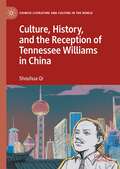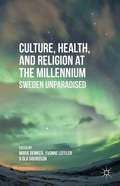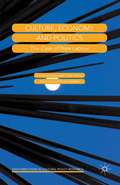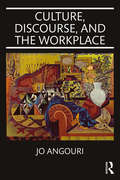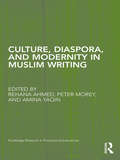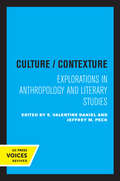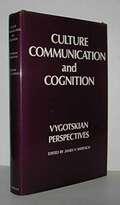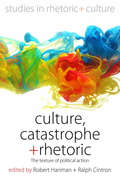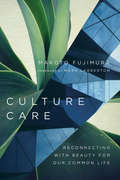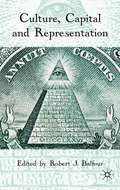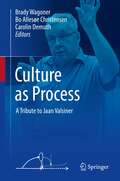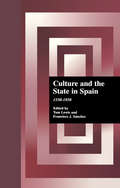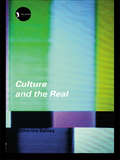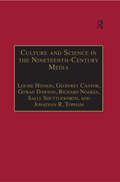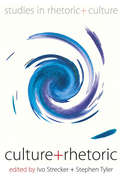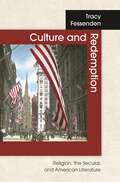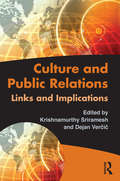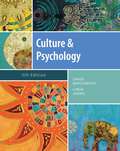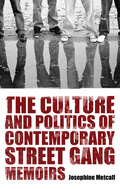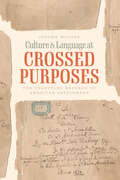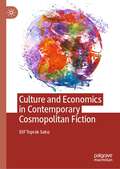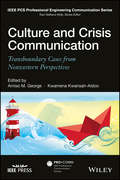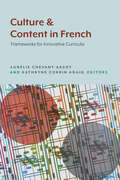- Table View
- List View
Culture, History, and the Reception of Tennessee Williams in China (Chinese Literature and Culture in the World)
by Shouhua QiThis book is the first comprehensive study of the reception of Tennessee Williams in China, from rejection and/or misgivings to cautious curiosity and to full-throated acceptance, in the context of profound changes in China’s socioeconomic and cultural life and mores since the end of the Cultural Revolution. It fills a conspicuous gap in scholarship in the reception of one of the greatest American playwrights and joins book-length studies of Chinese reception of Shakespeare, Ibsen, O’Neill, Brecht, and other important Western playwrights whose works have been eagerly embraced and appropriated and have had catalytic impact on modern Chinese cultural life.
Culture, Health, and Religion at the Millennium: Sweden Unparadised
by Marie Demker Yvonne Leffler Ola SigurdsonThe book presents interpretations of culture, health, politics, and religion in Sweden today, Sweden transforms from the well-functioning but existentially bland economic wonder to a more fragmented and gloomy society. Contributors include scholars from film studies, literary studies, political science, religious studies and theology
Culture, Economy and Politics: The Case of New Labour (New Directions in Cultural Policy Research)
by David Hesmondhalgh Kate Oakley David Lee Melissa NisbettThis book focuses on cultural policy in the UK between 1997 and 2010 under the Labour party (or 'New Labour', as it was temporarily rebranded). It is based on interviews with major figures and examines a range of policy areas including the arts, creative industries, copyright, film policy, heritage, urban regeneration and regional policy.
Culture, Discourse, and the Workplace
by Jo Angouri*SHORTLISTED FOR THE 2019 BAAL BOOK PRIZE* Culture, Discourse, and the Workplace brings new theoretical and methodological insights to the complex relationship between language, culture, and identity in professional settings. Examining the politics of language use at work via a critical sociolinguistic approach, this book: Utilises three case studies from institutional and business contexts to provide a unique illustration of participants’ roles and ways of negotiating membership within the business meeting; Questions essentialist meanings of culture and the ways in which they constitute a powerful resource for employees to perpetuate or challenge the status quo in their professional setting; Includes a core section on methodology for the workplace discourse researcher as well as a section dedicated to FAQs and a worked example on data analysis; Provides future directions for workplace sociolinguistics as a field and makes a case for holistic research and multidisciplinary enquiry. Culture, Discourse, and the Workplace constitutes a key resource for students and teachers of intercultural communication and ESP and will also be of significant interest to researchers in the fields of workplace studies and business interaction.
Culture, Diaspora, and Modernity in Muslim Writing (Routledge Research in Postcolonial Literatures)
by Rehana Ahmed Peter Morey Amina YaqinFiction by writers of Muslim background forms one of the most diverse, vibrant and high-profile corpora of work being produced today - from the trail-blazing writing of Salman Rushdie and Hanif Kureishi, which challenged political and racial orthodoxies in the 1980s, to that of a new generation including Mohsin Hamid, Nadeem Aslam and Kamila Shamsie. This collection reflects the variety of those fictions. Experts in English, South Asian, and postcolonial literatures address the nature of Muslim identity: its response to political realignments since the 1980s, its tensions between religious and secular models of citizenship, and its manifestation of these tensions as conflict between generations. In considering the perceptions of Muslims, contributors also explore the roles of immigration, class, gender, and national identity, as well as the impact of 9/11. This volume includes essays on contemporary fiction by writers of Muslim origin and non-Muslims writing about Muslims. It aims to push beyond the habitual populist 'framing' of Muslims as strangers or interlopers whose ways and beliefs are at odds with those of modernity, exposing the hide-bound, conservative assumptions that underpin such perspectives. While returning to themes that are of particular significance to diasporic Muslim cultures, such as secularism, modernity, multiculturalism and citizenship, the essays reveal that 'Muslim writing' grapples with the same big questions as serve to exercise all writers and intellectuals at the present time: How does one reconcile the impulses of the individual with the requirements of community? How can one 'belong' in the modern world? What is the role of art in making sense of chaotic contemporary experience?
Culture/Contexture: Explorations in Anthropology and Literary Studies
by E. Valentine Daniel Jeffrey M. PeckThe rapprochement of anthropology and literary studies, begun nearly fifteen years ago by such pioneering scholars as Clifford Geertz, Edward Said, and James Clifford, has led not only to the creation of the new scholarly domain of cultural studies but to the deepening and widening of both original fields. Literary critics have learned to "anthropologize" their studies—to ask questions about the construction of meanings under historical conditions and reflect on cultural "situatedness." Anthropologists have discovered narratives other than the master narratives of disciplinary social science that need to be drawn on to compose ethnographies.Culture/Contexture brings together for the first time literature and anthropology scholars to reflect on the antidisciplinary urge that has made the creative borrowing between their two fields both possible and necessary. Critically expanding on such pathbreaking works as James Clifford and George Marcus's Writing Culture and Marcus and Michael M. J. Fischer's Anthropology as Cultural Critique, contributors explore the fascination that draws the disciplines together and the fears that keep them apart. Their topics demonstrate the rich intersection of anthropology and literary studies, ranging from reading and race to writing and representation, incest and violence, and travel and time. This title is part of UC Press's Voices Revived program, which commemorates University of California Press’s mission to seek out and cultivate the brightest minds and give them voice, reach, and impact. Drawing on a backlist dating to 1893, Voices Revived makes high-quality, peer-reviewed scholarship accessible once again using print-on-demand technology. This title was originally published in 1996.
Culture, Communication And Cognition: Vygotskian Perspectives
by James V. WertschCulture, Communication, and Cognition: Vygotskian Perspectives
Culture, Catastrophe, and Rhetoric: The Texture of Political Action (Studies in Rhetoric and Culture #7)
by Robert Hariman and Ralph CintronThis volume explores political culture, especially the catastrophic elements of the global social order emerging in the twenty-first century. By emphasizing the texture of political action, the book theorizes how social context becomes evident on the surface of events and analyzes the performative dimensions of political experience. The attention to catastrophe allows for an understanding of how ordinary people contend with normal system operation once it is indistinguishable from system breakdown. Through an array of case studies, the book provides an account of change as it is experienced, negotiated, and resisted in specific settings that define a society’s capacity for political action.
Culture Care: Reconnecting with Beauty for Our Common Life
by Makoto Fujimura15th Annual Outreach Magazine Resource of the Year - Culture Christianity Today's 2018 Book of the Year Award of Merit - Culture and the Arts "Culture is not a territory to be won or lost but a resource we are called to steward with care. Culture is a garden to be cultivated." Many bemoan the decay of culture. But we all have a responsibility to care for culture, to nurture it in ways that help people thrive. In Culture Care artist Makoto Fujimura issues a call to cultural stewardship, in which we become generative and feed our culture's soul with beauty, creativity, and generosity. We serve others as cultural custodians of the future. This is a book for artists, but artists come in many forms. Anyone with a calling to create—from visual artists, musicians, writers, and actors to entrepreneurs, pastors, and business professionals—will resonate with its message. This book is for anyone with a desire or an artistic gift to reach across boundaries with understanding, reconciliation, and healing. It is a book for anyone with a passion for the arts, for supporters of the arts, and for "creative catalysts" who understand how much the culture we all share affects human thriving today and shapes the generations to come. Culture Care includes a study guide for individual reflection or group discussion.
Culture, Capital and Representation
by Robert J. BalfourWith contributions ranging over three centuries, Culture, Capital and Representation explores how literature, cultural studies and the visual arts represent, interact with, and produce ideas about capital, whether in its early phases (the growth of stock markets) or in its late phase (global speculative capital).
Culture as Process: A Tribute to Jaan Valsiner
by Brady Wagoner Bo Allesøe Christensen Carolin DemuthJaan Valsiner has made numerous contributions to the development of psychology over the last 40 years. He is internationally recognized as a leader and innovator within both developmental psychology and cultural psychology, and has received numerous prizes for his work: the Alexander von Humboldt prize, the Hans Killian prize, and the Outstanding International Psychologist Award from the American Psychological Association. Having taught at Universities in Europe, Asia and north and south America, he is currently Niels Bohr professor at Aalborg University, Denmark. This book is the first to discuss in detail the different sides of Valsiner’s thought, including developmental science, semiotic mediation, cultural transmission, aesthetics, globalization of science, epistemology, methodology and the history of ideas. The book provides an overview, evaluation and extension of Valsiner’s key ideas for the construction of a dynamic cultural psychology, written by his former students and colleagues from around the world.
Culture and the State in Spain: 1550-1850 (Hispanic Issues)
by Tom Lewis Francisco J. SánchezThis volume address the role of literature in the formation of cultural notions of 'state,' 'nation,' 'subject,' and 'citizen' in Spain from the Renaissance to the Romantic period. It brings together literary scholars and historians of the Golden Age and the eighteenth and nineteenth centuries in a dialog framed by the rise and dissolution of the Absolutist state. Individual essays attempt to understand relationships between subjectivity and the state in Spain from the earliest articulations of the subject to the consolidation of an array of bourgeois subjectivities. The major argument running throughout the volume is that literary discourse, from the time it emerges in the sixteenth century to the time it coheres within a wholly modern concept of the aesthetic, actively develops forms of subjectivity in relation to institutions of class power. The intention of the volume is to clarify central problems regarding the emergence and function of literature across distinct modes of production, state formations, and hegemonic cultures. This book keeps open a debate on the long process through which literature and the aesthetic come to be constituted as a complex arena in which-sometimes directly, more often indirectly-the struggle for state power unfolds.
Culture and the Real: Theorizing Cultural Criticism (New Accents)
by Catherine BelseyWhat makes us the people we are? Culture evidently plays a part, but how large a part? Is culture alone the source of our identities? Some have argued that human nature is the foundation of culture, others that culture is the foundation of human identity. Catherine Belsey calls for a more nuanced, relational account of what it is to be human, and in doing so puts forward a significant new theory of culture. Culture and the Real explains with Professor Belsey's characteristic lucidity the views of recent theorists, including Jean-François Lyotard, Judith Butler and Slavoj Zizek, as well as their debt to the earlier work of Kant and Hegel, in order to take issue with their accounts of what it is to be human. To explore the human, she demonstrates, is to acknowledge the relationship between culture and what we don't know: not the familiar world picture presented to us by culture as 'reality', but the unsayable, or the strange region that lies beyond culture, which Lacan has called 'the real'. Culture, she argues, registers a sense of its own limits in ways more subtle than the theorists allow.This volume builds on the insights of Belsey's influential Critical Practice to provide not only an accessible introduction to contemporary theories of what it is to be human, but a major new contribution to current debates about culture. Taking examples from film and art, fiction and poetry, Culture and the Real is essential reading for those studying or working in cultural criticism, within the fields of English, Cultural Studies, Film Studies and Art History.
Culture and Science in the Nineteenth-Century Media (The Nineteenth Century Series)
by Louise Henson Geoffrey Cantor Gowan Dawson Richard Noakes Sally Shuttleworth Jonathan R. TophamWritten by literary scholars, historians of science, and cultural historians, the twenty-two original essays in this collection explore the intriguing and multifaceted interrelationships between science and culture through the periodical press in nineteenth-century Britain. Ranging across the spectrum of periodical titles, the six sections comprise: 'Women, Children, and Gender', 'Religious Audiences', 'Naturalizing the Supernatural', 'Contesting New Technologies', 'Professionalization and Journalism', and 'Evolution, Psychology, and Culture'. The essays offer some of the first 'samplings and soundings' from the emergent and richly interdisciplinary field of scholarship on the relations between science and the nineteenth-century media.
Culture And Rhetoric
by Ivo Strecker Stephen TylerWhile some scholars have said that there is no such thing as culture and have urged to abandon the concept altogether, the contributors to this volume overcome this impasse by understanding cultures and their representations for what they ultimately are - rhetorical constructs. These senior, international scholars explore the complex relationships between culture and rhetoric arguing that just as rhetoric is founded in culture, culture is founded in rhetoric. This intersection constitutes the central theme of the first part of the book, while the second is dedicated to the study of figuration as a common ground of rhetoric and anthropology. The book offers a compelling range of theoretical reflections, historical vistas, and empirical investigations, which aim to show how people talk themselves and others into particular modalities of thought and action, and how rhetoric and culture, in this way, are co-emergent. It thus turns a new page in the history of academic discourse by bringing two disciplines - anthropology and rhetoric - together in a way that has never been done before.
Culture and Redemption: Religion, the Secular, and American Literature
by Tracy FessendenMany Americans wish to believe that the United States, founded in religious tolerance, has gradually and naturally established a secular public sphere that is equally tolerant of all religions--or none. Culture and Redemption suggests otherwise. Tracy Fessenden contends that the uneven separation of church and state in America, far from safeguarding an arena for democratic flourishing, has functioned instead to promote particular forms of religious possibility while containing, suppressing, or excluding others. At a moment when questions about the appropriate role of religion in public life have become trenchant as never before, Culture and Redemption radically challenges conventional depictions--celebratory or damning--of America's "secular" public sphere. Examining American legal cases, children's books, sermons, and polemics together with popular and classic works of literature from the seventeenth to the twentieth centuries, Culture and Redemption shows how the vaunted secularization of American culture proceeds not as an inevitable by-product of modernity, but instead through concerted attempts to render dominant forms of Protestant identity continuous with democratic, civil identity. Fessenden shows this process to be thoroughly implicated, moreover, in practices of often-violent exclusion that go to the making of national culture: Indian removals, forced acculturations of religious and other minorities, internal and external colonizations, and exacting constructions of sex and gender. Her new readings of Emerson, Whitman, Melville, Stowe, Twain, Gilman, Fitzgerald, and others who address themselves to these dynamics in intricate and often unexpected ways advance a major reinterpretation of American writing.
Culture and Public Relations: Links And Implications (Routledge Communication Series)
by Dejan Verčič Krishnamurthy SrirameshCulture and Public Relations explores the impact of culture – societal and organizational – through the global lens of public relations. Structuring the volume around three themes -- culture as an environment for public relations; the culture of PR globally; and the impact of PR on culture -- the editors bring together compelling discussions on such questions as how spirituality, religion, and culture have affected public relations, and how public relations culture has been affected by the "corporate cultures" of business enterprises. Additionally, the volume provides studies on the effect of culture on public relations practice in specific countries. With contributors from Europe, Asia, Australia, and North America, this collection offers international perspectives on a topic that is growing increasingly important in public relations study and practice. It is required reading for scholars, researchers, and students in public relations and also has much to offer the business discipline, for those seeking to integrate culture and communication to their practices.
Culture and Psychology (5th Edition)
by David Matsumoto Linda JuangThis book puts psychological theories and concepts into a cross-cultural framework that invites readers to discover, question, and ultimately, understand the relationship between culture and psychology through exploration of topics like changing gender roles, sexuality, self-esteem, aggression, personality, and mate selection.
The Culture and Politics of Contemporary Street Gang Memoirs
by Josephine MetcalfThe publication of Sanyika Shakur's Monster: The Autobiography of an L.A. Gang Member in 1993 generated a huge amount of excitement in literary circles—New York Times book critic Michiko Kakutani deemed it a “shocking and galvanic book”—and set off a new publishing trend of gang memoirs in the 1990s. The memoirs showcased tales of violent confrontation and territorial belonging but also offered many of the first journalistic and autobiographical accounts of the much-mythologized gang subculture. In The Culture and Politics of Contemporary Street Gang Memoirs, Josephine Metcalf focuses on three of these memoirs—Shakur’s Monster; Luis J. Rodriguez’s Always Running: La Vida Loca: Gang Days in L.A.; and Stanley “Tookie” Williams’s Blue Rage, Black Redemption—as key representatives of the gang autobiography. Metcalf examines the conflict among violence, thrilling sensationalism, and the authorial desire to instruct and warn competing within these works. The narrative arcs of the memoirs themselves rest on the process of conversion from brutal, young gang bangers to nonviolent, enlightened citizens. Metcalf analyzes the emergence, production, marketing, and reception of gang memoirs. Through interviews with Rodriguez, Shakur, and Barbara Cottman Becnel (Williams’s editor), Metcalf reveals both the writing and publishing processes. This book analyzes key narrative conventions, specifically how diction, dialogue, and narrative arcs shape the works. The book also explores how these memoirs are consumed. This interdisciplinary study—fusing literary criticism, sociology, ethnography, reader-response study, and editorial theory—brings scholarly attention to a popular, much-discussed, but understudied modern expression.
Culture and Language at Crossed Purposes: The Unsettled Records of American Settlement
by Jerome McGannCulture and Language at Crossed Purposes unpacks the interpretive problems of colonial treaty-making and uses them to illuminate canonical works from the period. Classic American literature, Jerome McGann argues, is haunted by the betrayal of seventeenth- and eighteenth-century Indian treaties—“a stunned memory preserved in the negative spaces of the treaty records.” A noted scholar of the “textual conditions” of literature, McGann investigates canonical works from the colonial period, including the Arbella sermon and key writings of William Bradford, John Winthrop, Anne Bradstreet, Cotton Mather’s Magnalia, Benjamin Franklin’s celebrated treaty folios and Autobiography, and Thomas Jefferson’s Notes on the State of Virginia. These are highly practical, purpose-driven works—the record of Enlightenment dreams put to the severe test of dangerous conditions. McGann suggests that the treaty-makers never doubted the unsettled character of what they were prosecuting, and a similar conflicted ethos pervades these works. Like the treaty records, they deliberately test themselves against stringent measures of truth and accomplishment and show a distinctive consciousness of their limits and failures. McGann’s book is ultimately a reminder of the public importance of truth and memory—the vocational commitments of humanist scholars and educators.
Culture and Language at Crossed Purposes: The Unsettled Records of American Settlement
by Jerome McGannCulture and Language at Crossed Purposes unpacks the interpretive problems of colonial treaty-making and uses them to illuminate canonical works from the period. Classic American literature, Jerome McGann argues, is haunted by the betrayal of seventeenth- and eighteenth-century Indian treaties—“a stunned memory preserved in the negative spaces of the treaty records.” A noted scholar of the “textual conditions” of literature, McGann investigates canonical works from the colonial period, including the Arbella sermon and key writings of William Bradford, John Winthrop, Anne Bradstreet, Cotton Mather’s Magnalia, Benjamin Franklin’s celebrated treaty folios and Autobiography, and Thomas Jefferson’s Notes on the State of Virginia. These are highly practical, purpose-driven works—the record of Enlightenment dreams put to the severe test of dangerous conditions. McGann suggests that the treaty-makers never doubted the unsettled character of what they were prosecuting, and a similar conflicted ethos pervades these works. Like the treaty records, they deliberately test themselves against stringent measures of truth and accomplishment and show a distinctive consciousness of their limits and failures. McGann’s book is ultimately a reminder of the public importance of truth and memory—the vocational commitments of humanist scholars and educators.
Culture and Language at Crossed Purposes: The Unsettled Records of American Settlement
by Jerome McGannCulture and Language at Crossed Purposes unpacks the interpretive problems of colonial treaty-making and uses them to illuminate canonical works from the period. Classic American literature, Jerome McGann argues, is haunted by the betrayal of seventeenth- and eighteenth-century Indian treaties—“a stunned memory preserved in the negative spaces of the treaty records.” A noted scholar of the “textual conditions” of literature, McGann investigates canonical works from the colonial period, including the Arbella sermon and key writings of William Bradford, John Winthrop, Anne Bradstreet, Cotton Mather’s Magnalia, Benjamin Franklin’s celebrated treaty folios and Autobiography, and Thomas Jefferson’s Notes on the State of Virginia. These are highly practical, purpose-driven works—the record of Enlightenment dreams put to the severe test of dangerous conditions. McGann suggests that the treaty-makers never doubted the unsettled character of what they were prosecuting, and a similar conflicted ethos pervades these works. Like the treaty records, they deliberately test themselves against stringent measures of truth and accomplishment and show a distinctive consciousness of their limits and failures. McGann’s book is ultimately a reminder of the public importance of truth and memory—the vocational commitments of humanist scholars and educators.
Culture and Economics in Contemporary Cosmopolitan Fiction
by Elif Toprak SakızThis book investigates how culture and economics define novel forms of cosmopolitanism and cosmopolitan fiction. Tracing cosmopolitanism’s transition from universalism to vernacularism, the book opens up new avenues for reading cosmopolitan fiction by offering a precise and convenient set of terminology. The figure of the cosmoflâneur identifies a contemporary cosmopolitan character’s urban mobility and wandering consciousness in interaction with the global and the local. Posthuman cosmopolitanism also extends the meaning of cosmopolitan which comes to embrace the nonhuman alongside the human element. Defining narrative glocality, political hyper-awareness, and narrative immediacy, the book thoroughly explores how cosmopolitan narration forges direct responses to the contemporary world in postmillennial cosmopolitan novels. All of these concepts are elaborated in Ian McEwan’s Saturday (2005), Zadie Smith’s NW (2012), Salman Rushdie’s The Golden House (2017), and Kazuo Ishiguro’s Klara and the Sun (2021), to which world-engagement is central.
Culture and Crisis Communication: Transboundary Cases from Nonwestern Perspectives
by Amiso M. George Kwamena Kwansah-AidooA collection of case studies from nonwestern countries that offers an analysis of the significant role culture plays in crisis communication Culture and Crisis Communication presents an examination of how politics, culture, religion, and other social issues affect crisis communication and management in nonwestern countries. From intense human tragedy to the follies of the rich, the chapters examine how companies, organizations, news outlets, health organizations, technical experts, politicians, and local communities communicate in crisis situations. Taking a wider view than a single country’s perspective, the text contains a cross-cultural and cross-country approach. In addition, the case studies offer valuable lessons that organizations that wish to operate or are operating in those cultures can adopt in preparing and managing crises. The book highlights recent crisis events such as Syria’s civil war, missing Malaysia Flight MH370, andJapan’s Fukushima Daiichi nuclear power plant disaster. Each of the case studies examines how culture impacts communication and responses to crises. Authoritative, insightful, and instructive, this important resource: Analyzes how nonwestern cultures respond to crises Covers the role of culture in crisis communication in recent news events Includes contributions from 18 international authors who provide insight on nonwestern culture and crisis communication Written for communication professionals, academics, and students, Culture and Crisis Communication presents an insightful introduction to the topic of culture and crisis communication and then delves into illustrative case studies that explore intra-cultural and trans-boundary crisis communication.
Culture and Content in French: Frameworks for Innovative Curricula
by Aurélie Chevant-AksoyInstructors in today’s language classrooms face the challenge of preparing globally competent and socially responsible students with transcultural aptitude. As classroom content shifts toward communication, collaboration, and problem solving across cultural, racial, and linguistic boundaries, the teaching of culture is an integral part of foreign language education. This volume offers nontraditional approaches to teaching culture in a complex time when the internet and social networks have blurred geographical, social, and political borders.The authors offer practical advice about teaching culture with kinesthetics, music, improvisation, and communication technologies for different competency levels.The chapters also explore multi-literacies, project-based learning, and discussions on teaching culture through literature, media, and film.The appendices share examples of course syllabi, specific course activities, and extracurricular projects that explore culinary practices, performing arts, pop culture, geolocation, digital literacy, journalism, and civic literacy.
